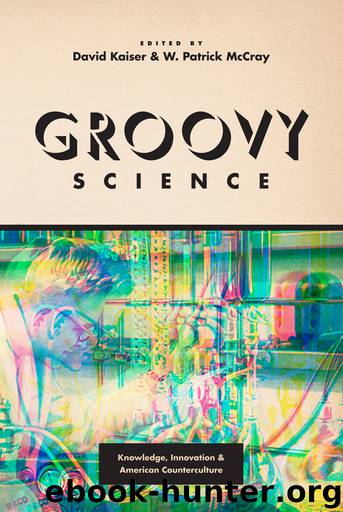Groovy Science: Knowledge, Innovation, and American Counterculture by Groovy Science; Knowledge Innovation & American Counterculture (2016)

Author:Groovy Science; Knowledge, Innovation & American Counterculture (2016)
Language: eng
Format: epub
ISBN: 9780226373072
Publisher: The University of Chicago Press
Published: 2016-04-20T04:00:00+00:00
This view fits nicely with Roszak’s antitechnocracy interpretation of the youth movement and Gell-Mann’s fears about a dawn of obscurantism. Surely this was part of his growing appeal: bringing up Velikovsky in class enraged science faculty. Yet explaining support of Velikovsky as expressing “anti-Establishment” sympathies is no explanation at all. In the 1970s everyone was opposed to the Establishment. As historian Bruce Schulman has observed: “Richard Nixon hated the establishment. He loathed the prep school and private club set, the opera-goers and intellectuals, the northeastern Ivy League elite.”22 When the president of the United States can claim anti-Establishment credentials, we need a more nuanced framework. The point was not opposition to an Establishment but what the Establishment signified to those who opposed it.
Support for Velikovsky concentrated among the lay public, humanists and social scientists, and, interestingly, scientists working for private industry.23 For Velikovsky and the inner circle, the youthful exuberance for his doctrines was both flattering and a bit of an embarrassment. As Chris Sherrerd, a peripheral member of his inner circle of devotees, wrote to Velikovsky in 1968: “I suspect that much of the support you are finding on college campuses is mot[i]vated not so much epistemologically but rather socially: as part of a general revolt of today’s youth against ‘the establishment.’”24 If youth were following Velikovsky en masse, the Velikovskians wanted it to be not because he was rejected by the “Establishment” but because he was right.
The issue of correctness crops up repeatedly in pro-Velikovsky articles and underscores that this movement was not “antiscience” in any straightforward way. One article from 1968 asserted that his resurgence “is due to one circumstance that the Scientific Establishment did not foresee when it all but unanimously dismissed Velikovsky as a crank and mocked his theories as ridiculous. With the accumulation of new knowledge, especially that gathered in the last decade by space probes”—such as the unexpectedly high temperature of Venus, radio noises emitted from a cold Jupiter, and especially the (disputed) detection of hydrocarbons in the Venusian atmosphere—“Velikovsky’s picture of the solar system has proved to be more accurate on many important points than the theories embraced by the Establishment.”25 (The first two of these findings are real phenomena, but astronomy both in the 1970s and today attributes them to conventional mechanisms of geophysics, such as the greenhouse effect for Venus; the hydrocarbon finding was later retracted as spurious.) A combination of excitement about new astrophysical discoveries, a chafing at the bonds of authority, and the widespread distribution of Velikovsky’s works in paperback changed the climate.
Nowhere was this more visible than in the rise of college courses dedicated to exploring Velikovsky’s work. Much as he had long predicted and fervently desired, Worlds in Collision became required reading in colleges across the United States and Canada, although not always in a manner that Velikovsky would have found flattering. For example, W. C. Straka, an assistant professor of astronomy at Boston University, taught a course called Science and Anti-science in Astronomy, where he assigned Worlds in Collision in order to debunk it.
Download
This site does not store any files on its server. We only index and link to content provided by other sites. Please contact the content providers to delete copyright contents if any and email us, we'll remove relevant links or contents immediately.
| Anthropology | Archaeology |
| Philosophy | Politics & Government |
| Social Sciences | Sociology |
| Women's Studies |
Cecilia; Or, Memoirs of an Heiress — Volume 1 by Fanny Burney(32548)
Cecilia; Or, Memoirs of an Heiress — Volume 2 by Fanny Burney(31947)
Cecilia; Or, Memoirs of an Heiress — Volume 3 by Fanny Burney(31931)
The Great Music City by Andrea Baker(31917)
We're Going to Need More Wine by Gabrielle Union(19034)
All the Missing Girls by Megan Miranda(15958)
Pimp by Iceberg Slim(14488)
Bombshells: Glamour Girls of a Lifetime by Sullivan Steve(14057)
For the Love of Europe by Rick Steves(13913)
Norse Mythology by Gaiman Neil(13349)
Talking to Strangers by Malcolm Gladwell(13349)
Fifty Shades Freed by E L James(13233)
Mindhunter: Inside the FBI's Elite Serial Crime Unit by John E. Douglas & Mark Olshaker(9324)
Crazy Rich Asians by Kevin Kwan(9279)
The Lost Art of Listening by Michael P. Nichols(7494)
Enlightenment Now: The Case for Reason, Science, Humanism, and Progress by Steven Pinker(7306)
The Four Agreements by Don Miguel Ruiz(6745)
Bad Blood by John Carreyrou(6611)
Weapons of Math Destruction by Cathy O'Neil(6265)
